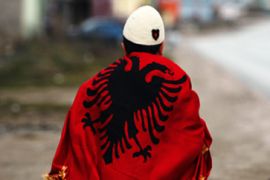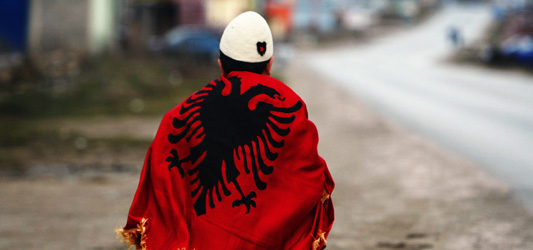Q&A: Kosovo and independence
A background to the Kosovan bid to formally secede from Serbia.

 |
| Kosovo’s potential bid for independence has divided international opinion [AFP] |
Kosovo, a province of Serbia, is soon expected to announce a formal declaration of independence.
Al Jazeera explains the province’s secession bid and how it has divided both regional and international opinion.
Why is Kosovo such a hotly contested province?
Although Kosovo is a province of Serbia, the overwhelming majority of the population is ethnic Albanian. While Serbia wants Kosovo to remain part of its territory, ethnic Albanians want full independence from Belgrade.
Although Serbian politicians remain divided on Belgrade’s possible accession to the European Union in the future, they are unananimous that Kosovo should not break away and become a state in its own right.
The majority of ethnic Albanians in Kosovo say they share few links to Serbia and that independence is the only way they can enjoy a stable future. Coversely, Serbs living in Kosovo fear a grim outcome should Kosovo go it alone.
Added to this, other countries are divided on Kosovo’s future status. While the US and most EU states favour independence for Kosovo, Russia is among those who are vehemently opposed to the idea.
What is the recent background to Kosovo’s drive for independence from Serbia?
Serbia’s continued resistance to Kosovo becoming a state in its own right was challenged in 1996 when the Kosovo Liberation Army (KLA), an armed force supported by ethnic Albanians, began targeting Serb police units in Kosovo.
Serb police forces started battling against KLA separatists in 1998, before Serbs voted against international mediation on Kosovo’s future in a referendum.
The KLA took control of an estimated 40 per cent of Kosovo in mid-1998 before Serb forces wrested the KLA-held area back.
 |
| Nationalist Serbs are particularly opposed to any plan by Kosovo to leave Serbia [AFP] |
In 1999, amid international pressure on Serbian president Slobodan Milosevic, Nato launched a 78-day aerial bombing campaign against Serbian forces who had attacked ethnic Albanians.
An estimated 800,000 ethnic Albanians fled from Serb forces into Albania and Macedonia during the Nato bombardment.
The United Nations has administered Kosovo since 1999, shortly after Serb forces were driven from the province.
In recent months, Martti Ahtisaari, a UN envoy, recommended a plan to set Kosovo on a path to supervised independence.
The timetable, which was rejected by Serbia, is likely to be followed by Kosovo’s administration should independence be declared.
How much support does Kosovo have in its independence bid?
The United States, Britain, France and Germany are among the countries supportive of Kosovo’s planned attempt to secede from Serbia.
Those countries may immediately recognise any formal declaration of independence by Kosovo.
Yet several other countries, including some with membership of the European Union, are opposed to the bid.
Russia, Spain, Cyprus, Slovakia, Greece and Romania are opposed to any independence declaration.
Moscow has deep religious and cultural links to Serbia and fears that Kosovo could eventually join the EU – at a time when Brussels has already made it clear that it wishes Serbia to join the bloc, subject to turning over senior leaders wanted for alleged abuses carried out during the Balkan wars of the 1990s.
The issue of independence is also uncomfortable to states who are trying to arrest the demands of pro-independence movements in parts of their own territory.
For example, Spain is anxious that a declaration of independence by Kosovo would strengthen the arm of Euskadi Ta Etasuna (ETA), in their demands for Basque independence.
Should Kosovo declare independence from Serbia, what will happen?
 |
| Support is overwhelming in Kosovo for independence from Belgrade [AFP] |
If the necessary two-thirds majority on independence is reached in Kosovo’s parliament after any declaration to secede from Serbia, the European Union will take charge of the territory, although 16,000 Nato officers will remain in place.
The Nato forces are tasked with ensuring that violence does not erupt between ethnic Albanians and Serbs living in Kosovo.
About half of the 120,000 Serb population lives south of the Ibar river in enclaves among the overwhelmingly ethnic Albanian population. Serb-dominated areas lie in the north of the province, just south of the Kosovo-Serbia border.
What about the future economic situation in Kosovo?
Most Serbs in Kosovo have rejected the administrative policies of the provincial government and thus receive employment salaries and other monies from Belgrade – in Serbian dinars rather than euros, which are most commonly used in Kosovo.
Foreign capital investment in Kosovo has been slow amid the continuing wrangling between Pristina and Belgrade over possible independence for the province.
Considering that a Kosovan declaration of independence has proved so divisive on the international stage, Pristina could find it difficult to secure financial loans from institutions such as the World Bank and International Monetary Fund.
Whether private investment will arrive in sufficient amounts to support the ailing local economy in the event of independence is an open question.
“We have a lot of minerals… and of course we have the youngest people in the region. More than 50 per cent of the population is under 25 years old, which means we have the labour which probably no other nation in the region has,” Shtend Ahnet, a Kosovan economist, told Al Jazeera.
“We’ve probably removed the biggest obstacle to direct foreign investment in Kosovo starting with telecommunications, but I think there are other obstacles ahead, such as infrastructure and electricity.”